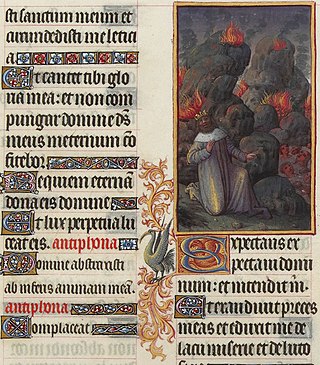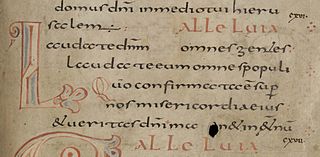Psalms is a book of the Hebrew Bible and the Christian Old Testament.
Contents
Psalm may also refer to:
- Psalms I, II, III, three commentaries by Mitchell Dahood
- Psalm West, youngest son of Kanye West and Kim Kardashian
Psalms is a book of the Hebrew Bible and the Christian Old Testament.
Psalm may also refer to:
Page most commonly refers to:

The Book of Psalms, also known as the Psalter, is the first book of the third section of the Tanakh called Ketuvim ('Writings'), and a book of the Old Testament.

Song of Ascents is a title given to fifteen of the Psalms, 120–134, each starting with the superscription "Shir Hama'aloth", or, in the case of Psalm 121, Shir Lama'aloth. They are also variously called Gradual Psalms, Fifteen Psalms, Songs of Degrees, Songs of Steps, songs for going up to worship or Pilgrim Songs.

A metrical psalter is a kind of Bible translation: a book containing a verse translation of all or part of the Book of Psalms in vernacular poetry, meant to be sung as hymns in a church. Some metrical psalters include melodies or harmonisations. The composition of metrical psalters was a large enterprise of the Protestant Reformation, especially in its Calvinist manifestation.
Psalm 151 is a short psalm found in most copies of the Septuagint (LXX), but not in the Masoretic Text of the Hebrew Bible. The title given to the psalm in the Septuagint indicates that it is supernumerary, as no number is affixed to it. The psalm is ascribed to David. It is also included in some manuscripts of the Peshitta. The psalm concerns the story of David and Goliath.

Psalm 23 is the 23rd psalm of the Book of Psalms, beginning in English in the King James Version: "The Lord is my shepherd". In Latin, it is known by the incipit, "Dominus regit me". The Book of Psalms is part of the third section of the Hebrew Bible, and a book of the Christian Old Testament. In the slightly different numbering system used in the Greek Septuagint and Latin Vulgate translations of the Bible, this psalm is Psalm 22.
Shane & Shane is a Texas-based contemporary worship music band known for acoustic praise and worship music. The band consists of Shane Barnard and Shane Everett (vocals). They are often joined by their drummer and manager, Joey Parish.
"On Eagle's Wings" is a devotional hymn composed by Michael Joncas. Its words are based on Psalm 91, Book of Exodus 19, and Matthew 13. Joncas wrote the piece in either 1976 or 1979, after he and his friend, Douglas Hall, returned from a meal to learn that Hall's father had died of a heart attack. It was recorded in 1979, with Hall as producer, published by North American Liturgy Resources and later purchased by New Dawn Music, a subsidiary of Oregon Catholic Press. It has become popular as a contemplative hymn at Catholic Masses as well as at Protestant services of worship.
A canticle is a hymn, psalm or other song of praise taken from biblical or holy texts other than the Psalms.
Selah is a word used 74 times in the Hebrew Bible. Its etymology and precise meaning are unknown, though various interpretations are given.

Psalm 146 is the 146th psalm of the Book of Psalms, beginning in English in the King James Version, "Praise ye the LORD. Praise the LORD, O my soul". In Latin, it is known as "Lauda anima mea Dominum".

Psalm 1 is the first psalm of the Book of Psalms, beginning in the English King James Version: "Blessed is the man", and forming "an appropriate prologue" to the whole collection according to Alexander Kirkpatrick. The Book of Psalms is part of the third section of the Hebrew Bible, and a book of the Christian Old Testament. In Latin, this psalm is known as "Beatus vir" or "Beatus vir, qui non abiit".

Psalm 8 is the eighth psalm of the Book of Psalms, beginning and ending in English in the King James Version (KJV): "O LORD, our Lord, how excellent is thy name in all the earth!". In Latin, it is known as "Domine Dominus noster". Its authorship is traditionally assigned to King David. Like Psalms 81 and 84, this psalm opens with a direction to the chief musician to perform upon the gittith, which either refers to a musical instrument, a style of performance, or alludes to persons and places in biblical history.

Psalm 34 is the 34th psalm of the Book of Psalms, beginning in English in the King James Version: "I will bless the LORD at all times: his praise shall continually be in my mouth." The Book of Psalms is part of the third section of the Hebrew Bible, and a book of the Christian Old Testament. In the slightly different numbering system used in the Greek Septuagint and Latin Vulgate translations of the Bible, this psalm is Psalm 33. In Latin, it is known as "Benedicam Dominum in omni tempore".

Psalm 40 is the 40th psalm of the Book of Psalms, beginning in English in the King James Version: "I waited patiently for the LORD". The Book of Psalms is part of the third section of the Hebrew Bible, and a book of the Christian Old Testament. In the slightly different numbering system used in the Greek Septuagint and Latin Vulgate translations of the Bible, this psalm is Psalm 39. In Latin, it is known by the incipit, "Expectans expectavi Dominum". It is described by the Jerusalem Bible as a "song of praise and prayer for help".

Psalm 139 is the 139th psalm of the Book of Psalms, beginning in English in the King James Version: "O Lord, thou hast searched me, and known me". In Latin, it is known as "Domine probasti me et cognovisti me". The psalm is a hymn psalm. Attributed to David, it is known for its affirmation of God's omnipresence. Alexander Kirkpatrick states that "the consciousness of the intimate personal relation between God and man which is characteristic of the whole Psalter reaches its climax here".

Psalm 62 is the 62nd psalm of the Book of Psalms, beginning in English in the King James Version: "Truly my soul waiteth upon God: from him cometh my salvation". The Book of Psalms is part of the third section of the Hebrew Bible, and a book of the Christian Old Testament. In the slightly different numbering system used in the Greek Septuagint version of the Bible and in the Latin Vulgate, this psalm is Psalm 61. In Latin, it is known as "Nonne Deo subiecta erit anima mea". The psalm offers a warning not to let one's power erode one's trust in God.

Psalm 117 is the 117th psalm of the Book of Psalms, beginning in English in the King James Version: "O praise the LORD, all ye nations: praise him, all ye people." In Latin, it is known as Laudate Dominum. Consisting of only two verses, Psalm 117 is the shortest psalm and also the shortest chapter in the whole Bible. It is joined with Psalm 118 in the manuscripts of the Hebraist scholars Benjamin Kennicott and Giovanni Bernardo De Rossi.
PS-10, PS 10, PS.10, PS10, may refer to:

Psalms II is the tenth studio album by Shane & Shane. WellHouse Records released the album on October 23, 2015. This album charted on six Billboard magazine charts, including, The Billboard 200.